
The TurboGrafx-16, known as the PC Engine outside North America, is a home video game console designed by Hudson Soft and sold by NEC Home Electronics. It was the first console marketed in the fourth generation, commonly known as the 16-bit era, however in actuality, the console has an 8-bit central processing unit (CPU) coupled with a 16-bit graphics processor, effectively making the claim somewhat false advertising. It was released in Japan in 1987 and in North America in 1989. In Europe the Japanese model was unofficially imported and distributed in the United Kingdom and France from 1988. In Japan, the system was launched as a competitor to the Famicom, but the delayed United States release meant that it ended up competing with the Sega Genesis and later the Super NES.

Angelique is a Japanese otome game series and media franchise. There are various OVAs, Drama CDs, Music CDs and Anime series, developed along with the base game, or broadcast on TV channels, etc. The series began in 1994 and has continued since. The latest entry in the series is Angelique Luminarise, released in 2021.

Tengai Makyō, also known as Far East of Eden, is a series of role-playing video games released in Japan and Taiwan. The series was conceived by Oji Hiroi and developed by Red Company, debuting on the PC Engine CD-ROM² System in 1989.
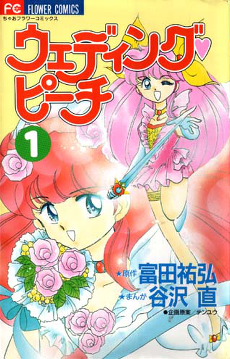
Wedding Peach is a shōjo manga written by Sukehiro Tomita and illustrated by Nao Yazawa that was originally serialized in Shogakukan's Ciao magazine. In North America, it was translated and published by VIZ Media in its entirety, consisting of six volumes.

Thank You, My Twilight is an album released by The Pillows on October 23, 2002. The song "Biscuit Hammer" contains a reference to The Great Dictator, Charlie Chaplin's first film to employ spoken dialog. The titular song is featured in several episodes of FLCL Progressive and FLCL Alternative.

Nintendo World Cup is a soccer video game for the Family Computer/NES and Game Boy, developed by Technōs Japan and released in 1990. It is a localization of Nekketsu High School Dodgeball Club: Soccer, the fourth Kunio-kun game released for the Family Computer. Ports for the PC Engine and Mega Drive were also released in Japan. A Game Boy version was released in Japan, North America, and Europe.

Puyo Puyo 2 is a 1994 puzzle video game developed and published by Compile. It is the second installment in the Puyo Puyo series and the sequel to Puyo Puyo (1992).
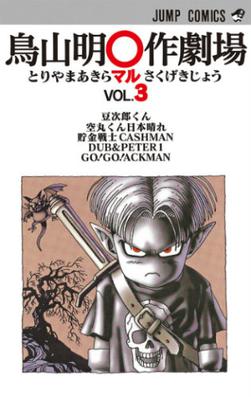
Go! Go! Ackman is a Japanese manga series written and illustrated by Akira Toriyama. It was published irregularly in V Jump for 11 chapters from July 1993 to October 1994. Go! Go! Ackman is a humorous series about a demon child named Ackman who harvests souls for the Great Demon King. It was adapted into an animated short film and several video games. Viz Media released the manga in North America on December 7, 2021 as part of Akira Toriyama's Manga Theater.
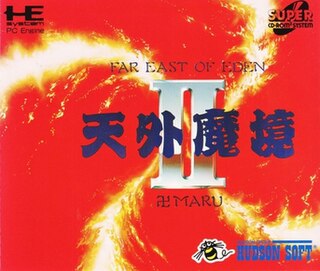
Tengai Makyō II: Manji Maru, also known as Far East of Eden II: Manji Maru, is a role-playing video game and the second game in the Tengai Makyō series. It was first released in 1992 for the PC Engine Super CD-ROM² by Hudson Soft and developed by Red Company.
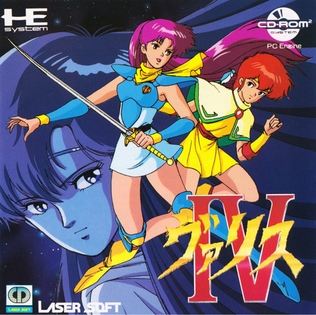
Valis IV is a 1991 action-platform video game originally developed by Laser Soft and published by Telenet Japan for the PC Engine CD-ROM². A vastly different version titled Super Valis IV was published in Japan by Telenet in 1992 and in North America by Atlus Software in 1993 for the Super Nintendo Entertainment System. It is the fourth and final main entry in the eponymous series. Following on the events of Valis III, Yuko became a goddess and has watched over Vecanti since Glames' defeat. The dark world prince Galgear, who lost self-control after acquiring a magical ring, broke from his fifteen-year imprisonment by the gods of Vecanti, kidnapping Valna and being pursued by troops led by Cham. Lena, a member of Cham's band, is joined by her sister Amu and the prince's father Asfal on a journey to retrieve the titular sword and defeat Galgear.
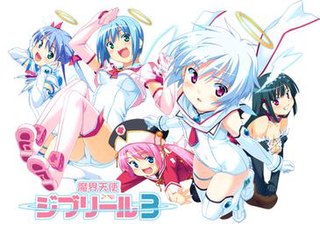
Djibril The Devil Angel is an eroge visual novel series created by Frontwing composed of the classic entries and one spinoff, titled MegaChu. Each of the entries have also spawned trimmed down erotic OVA releases, which enjoyed mild popularity in the west. This series is created by Kūchū Yōsai and produced by Noboru Yamaguchi.

Dragon Slayer: The Legend of Heroes is a 1989 role-playing game developed by Nihon Falcom. It is the sixth game in the Dragon Slayer series and the first in The Legend of Heroes franchise.

"Miss You" is the 11th single of Japanese artist Yuna Ito slated for a release on September 3, 2008.

Otaku no Seiza: An Adventure in the Otaku Galaxy is a role-playing video game developed by Advance Communications and published by M&M for the Famicom on 1991. Aurora Quest: Otaku no Seiza in Another World is a remake of the Famicom version for the PC Engine Super CD-ROM by Pack-In-Video in December 1993–which featured updated graphics. Neither version was released outside of Japan. An OVA adaptation of this was also released in Japan on 1994.
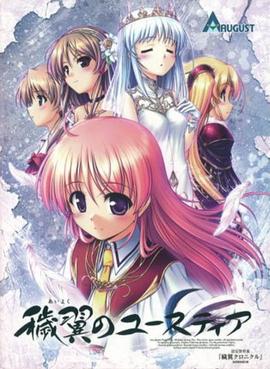
Aiyoku no Eustia is a Japanese adult visual novel developed by August for Windows and was released on April 28, 2011. Aiyoku no Eustia is August's eighth game, preceded by Fortune Arterial and Yoake Mae yori Ruriiro na: Moonlight Cradle. It was planned to be released on March 25, but the schedule was changed due to the Great East Japan earthquake. An enhanced port for the PlayStation Vita titled Aiyoku no Eustia: Angel's Blessing was released on June 26, 2014. The game was released exclusively in Japan for the Nintendo Switch and PlayStation 4 on June 23, 2022. Two manga volumes based on Aiyoku no Eustia were published by Kadokawa Shoten. Novels, comic anthologies and drama CD's have also been released.
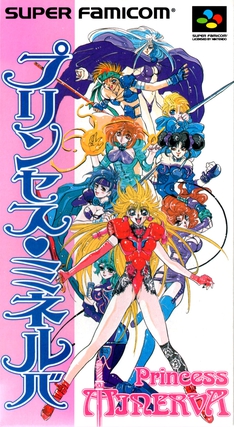
Princess Minerva is a role-playing video game developed and published by Riverhillsoft for the NEC PC-9801 in 1992 in Japan only. An original video animation by Group TAC was originally released by Toho in May 1995 in Japan; it was later released also in the United States. The extended franchise also includes a manga series, an illustrated serial novel, and other media.

Cross Ange: Rondo of Angels and Dragons, also known as simply Cross Ange, is a Japanese mecha anime television series produced by Sunrise that aired from October 2014 to March 2015. A manga adaptation began publication in August 2014.

The Angel Next Door Spoils Me Rotten is a Japanese light novel series written by Saekisan and illustrated by Hanekoto. Originally published online on Shōsetsuka ni Narō, SB Creative has released ten volumes of the series under their GA Bunko label since June 2019. Yen Press holds the license to publish the series in North America in English. A manga adaptation with art by Wan Shibata and composition by Suzu Yūki has been serialized via Square Enix's online manga magazine Manga Up! since January 2022. As of August 2024, its chapters have been collected in four tankōbon volumes. An anime television series adaptation produced by Project No.9 aired from January to March 2023. A second season has been announced.


















